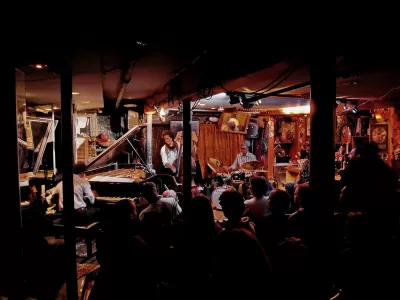A new real estate investment fund wants to help music venue owners buy their properties and stay in business as the pandemic and market forces decimate their earnings.

When the pandemic shut down live entertainment, music venues saw their revenues plummet as much as 90%, with many struggling to keep paying their bills. To help venues stay afloat, Dayna Frank, owner of First Avenue Music Hall in Minneapolis, worked with Grubb Properties CEO Clay Grubb to create "the Live Venue Recovery Fund, a pioneering program that provides eligible independent music operators with a 3 – 5 year roadmap toward purchasing their own venues." Rebecca Greenwald reports on the fund's efforts for Next City.
As renters, Frank believes, many venue owners are extremely vulnerable to "a growing affordability crisis and the whims of opportunistic landlords, and the looming threat of Live Nation’s growing influence and consolidation of the industry." The recovery fund aims to shift the balance of power and give venue operators a path to ownership. "Designed around an impact fund real estate model, the Live Venue Recovery Fund caps Grubb’s rate of return at 12%, after which any remaining returns are donated to the National Independent Venue Foundation, a nonprofit related to the National Independent Venue Association (NIVA), a trade association that was formed at the start of the pandemic."
"Rather than looking at the Live Venue Recovery Fund as an aggressive acquisition program," writes Greenwald, "Frank sees this as a resource and another option that venues have available to them as they navigate a challenging external environment."
FULL STORY: Will This Impact Fund Save America’s Music Venues?

Planetizen Federal Action Tracker
A weekly monitor of how Trump’s orders and actions are impacting planners and planning in America.

USGS Water Science Centers Targeted for Closure
If their work is suspended, states could lose a valuable resource for monitoring, understanding, and managing water resources.

Congress Moves to End Reconnecting Communities and Related Grants
The House Transportation and Infrastructure Committee moved to rescind funding for the Neighborhood Equity and Access program, which funds highway removals, freeway caps, transit projects, pedestrian infrastructure, and more.

Pittsburgh Excels at Low-Cost, Quick-Build Traffic Calming
The city’s traffic calming initiative has led to a 6 percent average reduction in speeds on corridors with recent interventions.

Seattle Transit Asked to Clarify Pet Policy
A major dog park near a new light rail stop is prompting calls to update and clarify rules for bringing pets on Seattle-area transit systems.

Oregon Bill Would End Bans on Manufactured Housing
The bill would prevent new developments from prohibiting mobile homes and modular housing.
Urban Design for Planners 1: Software Tools
This six-course series explores essential urban design concepts using open source software and equips planners with the tools they need to participate fully in the urban design process.
Planning for Universal Design
Learn the tools for implementing Universal Design in planning regulations.
City of Moorpark
City of Tustin
Tyler Technologies
City of Astoria
Transportation Research & Education Center (TREC) at Portland State University
Chaddick Institute at DePaul University
Regional Transportation Commission of Southern Nevada
Toledo-Lucas County Plan Commissions





























